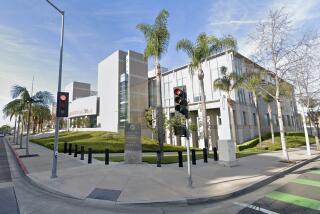New Hearing Begins in ’96 Shooting Case
- Share via
Two years ago, Danny Zizumbo was sentenced to 38 years in prison for shooting a teenager in the leg during a drive-by attack in east Ventura.
A jury convicted him of attempted murder, conspiracy to commit murder and deadly assault after a five-day trial during which prosecutors argued that Zizumbo, then 21, was the man wielding a semiautomatic gun in a gang-motivated attack.
But troubling questions have since been raised about whether that jury was presented a full picture--questions serious enough for the California Supreme Court to send the case back to Ventura County Superior Court for further review.
On Tuesday, those proceedings began before Judge Brian J. Back, who must decide whether Zizumbo’s trial attorney, Wayne Redmond, committed errors so egregious as to warrant a new trial.
In court papers, appellate attorney Leonard Chaitin argues that Zizumbo did not receive a fair trial because Redmond failed to raise important objections to evidence presented by the prosecution, including an inadmissible statement to police.
Redmond, whose practice is in Woodland Hills, is expected to testify this afternoon.
This week’s hearing, which is expected to last three days, is the latest twist in an unusual and, at times, controversial case.
Zizumbo’s prosecution was the final straw for managers of Cabrillo Village, a federally subsidized housing development in east Ventura. Three months after Zizumbo pleaded not guilty, housing officials evicted the gang member’s family.
They argued that Zizumbo and his brother, Edward, had terrorized the close-knit community for too long as a result of their gang ties. The family appealed the eviction, and lost in a 2-1 decision.
At the time, the family hired Chaitin, a Lancaster attorney, to fight the eviction. Chaitin later became Danny Zizumbo’s appellate attorney.
In Zizumbo’s criminal appeal, Chaitin argued that critical evidence pointing to his client’s innocence--most notably, witness accounts identifying another man as the shooter--was ignored by the defense attorney, and thus never considered by the jury.
The shooting occurred Jan. 8, 1996. Daniel Rodriguez, then 16, was walking to a friend’s house in the 1300 block of Arrowhead Avenue with three other teens when shots were fired from a white van. Rodriguez was hit in the leg and received a less severe wound to the chest.
At the time, Rodriguez and one of his friends identified the gunman as 16-year-old Victor Ocegueda. Chaitin played a 911 tape in court Tuesday in which witnesses at the scene are heard shouting Ocegueda’s name as the shooter.
In his appeal, Chaitin said that evidence was never presented to the jury. He also said that his client’s Miranda rights were violated by Ventura police who interviewed him after the shooting.
During the police investigation, Ocegueda, and a third gang member, 19-year-old Eric Martinez, fingered Zizumbo as the gunman, according to the appeal.
Officers interrogated Zizumbo for several hours without reading him his rights, the appeal states. During the interview, Zizumbo acknowledged being in the van during a trip to a fast-food restaurant--a statement used during the trial.
Two higher courts have since agreed that the so-called admission should not have been allowed.
The Supreme Court granted Zizumbo’s petition for review of the case in December, and sent it back to the Court of Appeal. It is now in Superior Court for the purposes of an evidentiary hearing in which the prosecution must show that Zizumbo’s attorney was not “inefficient.”
In turn, Chaitin must show that there was significant evidence that the defense failed to raise at trial.
More to Read
Sign up for Essential California
The most important California stories and recommendations in your inbox every morning.
You may occasionally receive promotional content from the Los Angeles Times.













